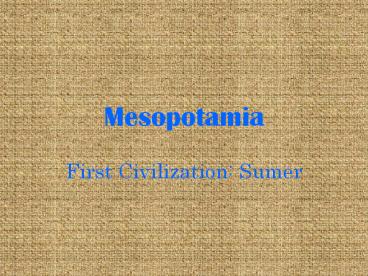Mesopotamia - PowerPoint PPT Presentation
1 / 10
Title:
Mesopotamia
Description:
Mesopotamia First Civilization: Sumer Basic Geography Land between the Persian Gulf and the Mediterranean Sea is called Fertile Crescent. It is called the fertile ... – PowerPoint PPT presentation
Number of Views:219
Avg rating:3.0/5.0
Title: Mesopotamia
1
Mesopotamia
- First Civilization Sumer
2
Basic Geography
- Land between the Persian Gulf and the
Mediterranean Sea is called Fertile Crescent. - It is called the fertile crescent because the
dark rich soils helped grow golden wheat fields - Few natural barriers which made it easy to settle
for nomadic people. However it also had few
natural barriers so it was common to invaders
3
More Geography
- Mesopotamia means the land between the rivers.
- The first known civilization in the Fertile
Crescent was Sumer on the Tigris and Euphrates
Rivers - The Tigris and Euphrates often suffered from
severe flooding. They often tore apart the top
soil and ruined homes and fields. Negative view
of afterlife
4
Ancient Sumer
- GOVERNMENT Priest King (Temple Priest)
- - Not only launched irrigation projects they also
were the go-between people to the gods.
5
City-States
- Sumerians had many city-states All city-states
shared the same culture but developed their own
government. - All cities are protected by high, wide walls
6
Religion
- Polytheistic- Belief in many gods
- Enlil- god of storms and air was the most powerful
- Ziggurat- Every city had one of these
- Wonderful temples/city halls
- Afterlife was a grim underworld from which
there was no release
7
(No Transcript)
8
Writing
- Cuneiform
9
Why Important?
- Brick laying
- Cradle of Civilization 1st Civilization
10
Interesting Facts!
- Epic of Gilgamesh
- Excellent in mathematics such as algebra and
geometry
The Epic of Gilgamesh is one of the oldest poems
in world literature. Parts of the poem were
composed in Mesopotamia before 2000 b.c.e. The
epic tells the story of Sumerian king, Gilgamesh,
who oppresses his people and must fight Enkidu, a
being created by the gods to be their champion.
Gilgamesh defeats Enkidu and makes friends with
him. They have many adventures together before
Enkidu dies and Gilgamesh continues on to seek
immortality. The epic includes the story of a
great flood, much like the one that Noah survives
in the biblical account - McDougal LIttell































